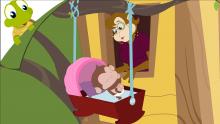
“Aiken Drum” is a popular Scottish folk song and nursery rhyme, which probably has its origins in a Jacobite song about the Battle of Sheriffmuir (1715).
"Aiken Drum" Lyrics
Modern versions of the lyrics include:
There was a man lived in the moon, lived in the moon, lived in the moon,
There was a man lived in the moon,
And his name was Aiken Drum.
Chorus
And he played upon a ladle, a ladle, a ladle,
And he played upon a ladle,
and his name was Aiken Drum.
And his hat was made of good cream cheese, of good cream cheese, of good cream cheese,
And his hat was made of good cream cheese,
And his name was Aiken Drum.
And his coat was made of good roast beef, of good roast beef, of good roast beef,
And his coat was made of good roast beef,
And his name was Aiken Drum.
And his buttons made of penny loaves, of penny loaves, of penny loaves,
And his buttons made of penny loaves,
And his name was Aiken Drum.
And his waistcoat was made of crust pies, of crust pies, of crust pies,
And his waistcoat was made of crust pies,
And his name was Aiken Drum.
And his breeches made of haggis bags, of haggis bags, of haggis bags,
And his breeches made of haggis bags,
And his name was Aiken Drum.
Other versions of the song include the lyrics:
His hat was made of guid cream cheese,
His coat was made of fine rost beef,
His buttons were made of bawbee baps, (a bread roll, costing a halfpenny),
His breeks (/breechs) were made of haggis sacks.
"Aiken Drum" Chords
E A E B7
There was a man lived in the moon, in the moon, in the moon.
E A E B7 E
There was a man lived in the moon and his name was Aiken Drum.
(CHORUS)
E A E B7
And he played upon a ladle, a ladle, a ladle,
E A E B7 E
He played upon a ladle, and his name was Aiken Drum.
E A E B7
And his hair was made of spaghetti spaghetti spaghetti.
E A E B7 E
His hair was made of spaghetti and his name was Aiken Drum.
E A E B7
And his eyes were made of meatballs meatballs meatballs.
E A E B7 E
His eyes were made of meatballs and his name was Aiken Drum.
(CHORUS)
E A E B7
And he played upon a ladle, a ladle, a ladle,
E A E B7 E
He played upon a ladle, and his name was Aiken Drum.
E A E B7
And his nose was made of cheese cheese cheese.
E A E B7 E
His nose was made of cheese and his name was Aiken Drum.
E A E B7
And his mouth was made of pizza pizza pizza.
E A E B7 E
His mouth was made of pizza and his name was Aiken Drum.
(CHORUS)
E A E B7
And he played upon a ladle, a ladle, a ladle,
E A E B7 E
He played upon a ladle, and his name was Aiken Drum.
E A E B7
There was a man lived in the moon, in the moon, in the moon.
E A E B7 E
There was a man lived in the moon and his name was Aiken Drum.
E A B7
e|------------------2-------------------------------|
B|-----------2--------------------------------------|
G|----1------2------2-------------------------------|
D|----2------2-----1--------------------------------|
A|----2-------------2-------------------------------|
E|------------------x-------------------------------|
"Aiken Drum" Origins
The rhyme was first printed by James Hogg in Jacobite Reliques in 1820, as a Jacobite song about the Battle of Sheriffmuir (1715) which includes the words:
Ken you how a Whig can fight,
Aikendrum, Aikendrum?
Ken you how a Whig can fight, Aikendrum?
He can fight the hero bright,
With swift heels and armour light,
And his wind of heav’nly might, Aikendrum, Aikendrum!
Is not Rowley in the right, Aikendrum?
Sir Walter Scott in his novel The Antiquary (1816) refers to Aiken Drum in a story told by an old beggar about the origins of what has been perceived by the protagonist as a Roman fort. The beggar tells him that it was actually built by him and others for “auld Aiken Drum’s bridal” and that one of the masons cut the shape of a ladle into the stone as a joke on the bridegroom. The reference suggests that the rhyme, and particularly the chorus, was well enough known in the early nineteenth century for the joke to be understood.
"Aiken Drum" Youtube Videos



